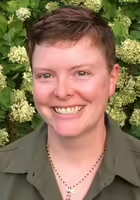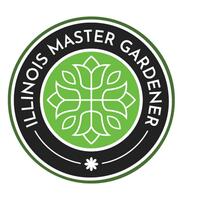
DuPage County Master Gardeners
Take Your Love of Gardening to the Next Level
The University of Illinois Extension Master Gardener Program is a volunteer program open to anyone with the desire to learn and to share information with others about research-based landscape and gardening practices.
Master Gardeners reach into the communities with a variety of projects in partnership with local organizations, and they also staff the Master Gardener Help Desk by assisting residents with garden and landscape questions.
Volunteers participate in extensive training sessions conducted by University of Illinois Extension specialists and educators in horticulture, insects, diseases, grasses, woody and herbaceous ornamentals, and fruits and vegetables.
Join us for upcoming events near you
- Aurora Public Library's Seed Swap | Jan. 31 | Aurora (Eola Road location)
- Kane County Seed Swap | Jan. 25 | St. Charles
- Kendall County Seed Swap | Jan. 31 | Yorkville
- Winter Fruit Tree Pruning Workshop | Feb. 4 | Naperville
- Winter Fruit Tree Pruning Workshop | Feb. 11 | Online
- Rooted: A Plant-Based Conference | Feb. 21 | College of DuPage
Let us help you grow.
Interested in volunteering? You do not need to be an experienced gardener to qualify. If you are looking for a way to give back and to grow your knowledge of horticulture, this may be the opportunity for you.
If you are a DuPage County resident and would like to receive information about the next Master Gardener training, please complete this Master Gardener Training Interest Form. You will be placed on our email list to receive information about the next informational meeting and the application process.
To become a Master Gardener, you must attend the orientation meeting where you will learn about our program and how to apply. The horticulture staff reviews all applications and an interview is required.
The Master Gardener training includes 40 hours of horticultural training in a wide variety of topics. In return, trainees are required to volunteer 40 hours to the program, and staffing the Master Gardener Help Desk is required for the first 24 of those volunteer hours.
Open: March-October | Monday-Wednesday-Friday
Hours: 10 a.m. to 1 p.m.
- Submit your question online
- Call 630-955-1123
- Visit 1100 E. Warrenville Road, Suite 170, Naperville, IL 60563
- Email uiemg-dupage@illinois.edu
Request a Master Gardener for a meeting or event
University of Illinois Extension is pleased to present horticultural programs to your DuPage County group. We offer a wide range of topics to reflect various seasons, gardening styles, and plants.
View available topics and program summaries below. To request a program, please fill out the Request Form.
Topic choices for presentations
Bargain Gardens - Don't let a limited budget keep you out of the garden. Find out how gardens can be simple, fun, and inexpensive. You’ll learn gardening tips and ideas that will save you time and money.
Bulbs: Basics, Myths, and Truths - Bust some of the myths we always thought were true with latest research. This presentation is an interactive style that will allow the presenter to make a statement allowing the audience to vote if they think it is a truth or myth before revealing the answer. This presentation will allow the Master Gardeners to teach the basics of bulb care during the late summer and fall months while gardeners are planting.
Composting: Building Your Garden from the Ground Up - This program touts the benefits of composting. Improve the health and vitality of your garden by using the organic matter generated in your home and yard.
Container Gardening - Participants will learn how to select, plant, and maintain container gardens so that they can become attractive season long additions to the home landscape. Program includes recipes for outstanding container displays.
Designing a Flower Bed with Seasonal Interest - Have you ever seen a garden that just took your breath away? You visit again, two months later, and the garden is again in full glory. How do people do this? How do design a garden that offers visual interest through the seasons? This lesson will walk you through the design process step-by-step, You will learn how to plan a garden that will offer you visual interest spring through fall with a few winter accents as well.
Easy Care Native Plants - Many home gardeners would like to add native plants to their garden, but are unsure how to start. This program takes a look at the native plants that are low maintenance and grow in a wide range of conditions. Native grasses, wildflowers, trees and shrubs will be covered.
Edible Landscapes - By combining fruit and nut trees, vegetables, herbs, edible flowers or berry bushes in aesthetically pleasing ways, edible landscapes can be just as attractive as ornamental ones. Learn how to eat your yard by creating a tasteful home landscape using edible plants.
Energy Efficient Landscaping - Sustainable and energy efficient landscapes are common buzzwords in today’s gardening circles and can be overwhelming to the novice gardener. Learn tips for how your landscape can help keep your energy costs down and make you yard more environmentally friendly.
Fall Garden Clean-Up - End of the growing season cleanup can be a daunting task, especially with large yards. This presentation will help organize fall tasks into an easy month-by-month to-do list and provide a printable checklist to help you check-off the tasks.
How to Have Healthy Houseplants - Houseplants add life and beauty to a home. Learn simple tips to select and care for houseplants. After this program, even those with “brown garden thumbs” will know how to have healthy houseplants throughout their home.
How to Kill Your Tree: A guide of What NOT to Do - Sometimes a treeʼs biggest pest is the homeowner. This presentation discusses common mistakes homeowners make when planting and maintaining their most valuable landscape investment, their trees.
Insect Hotels - If you’ve ever wondered who might check in, what these tiny lodgings are made of, or how to keep your six‑legged guests happy, this talk is for you. We’ll explore the delightful world of backyard “hospitality,” from choosing the right materials to offering top‑notch maintenance. By the end, you’ll be ready to run the most sought‑after bee hotel on the block—no tiny mints on pillows required.
Late Summer and Fall Colors in the Garden - Late summer and fall gardens often look worn out and tired after the riot of spring and summer color. Our fall gardens don’t have to look tired and past their prime. Many plants are available to give you a fall “WOW” factor. Learn how to rev up your August-September garden with perennials, ornamental grasses and the fall color of trees & shrubs.
The Meaning of Flowers: Floriography - Should you send a red or white rose to the one you love? Through the ages, various flowers and floral arrangements have taken on subtle and secret messages that allow us to express our unspoken feelings. Learn how to send the most appropriate floral message to your friends and family.
Native Pollinators - When it comes to pollination, honey bees get a majority of the attention. However, many insects play a role in pollination. This presentation will discuss different native pollinators and how to make your landscape attractive to them.
Seed Starting: Giving Your Garden a Head Start - Jump-start the spring growing season. Learn about the equipment and methods used for starting seeds indoors. This program offered in winter and early spring only.
Selecting Trees & Shrubs - Trees and shrubs are the backbones of a well-landscaped garden. Their shapes, colors, flowers, and fruits change with the seasons providing beauty throughout the year. Learn how to select the proper trees and shrubs for specific sites.
Vegetable Gardening - Learn the basics of vegetable gardening: preparation of the soil, choosing the right location and selecting plant varieties to help you successfully grow your own vegetables.
Winter Sowing - Learn this easy method of seed starting. Seeds are planted in "mini greenhouses" during the cold winter months, germinate outside, and are ready to transplant once the ground thaws.
Meet our team


Jamie Viebach
Resources for current Master Gardener volunteers
- GivePulse (volunteer hours reporting)
- Illinois Master Gardener Current Volunteer Resources
- Horticulture YouTube videos
- Community Gardening Webinar Series
Not a certified Master Gardener or in our training program? Find out about Master Gardener training in your area on one of our program pages: DuPage County, Kane County or Kendall County.
